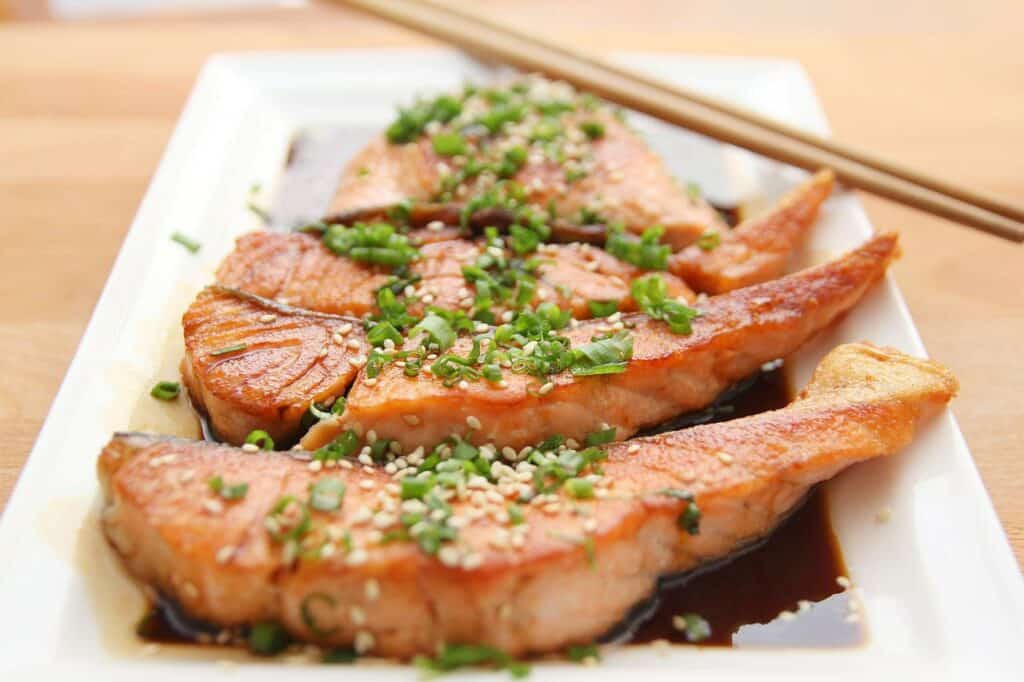Your dog enjoys accompanying you while feeding the fish.
You noticed the stock of fish food is running low.
After investigating the matter, you discovered that your dog has been sneaking bites of fish food.
While it may not be a healthy practice for your dog, you’re not sure if it’s harmful.
So, can fish food kill dogs?
Fish food can’t kill your dog outright.
However, it can cause health problems down the road if consumed in large quantities.
Fish food is typically high in fat and salt content.
These two ingredients can cause obesity and high blood pressure in dogs.
Thus, exercise caution if you notice your dog snacking on fish food.
In this article, we’ll explore the dangers of fish food and how it can impact your dog’s health.
We’ll also provide some tips on preventing your dog from consuming fish food.

What Happens if My Dog Eats Fish Food?
Unless your furry friend is allergic to one or some ingredients in fish food, the chances of your dog dying from eating fish food are slim.
However, that doesn’t mean you should allow your dog to munch on fish food regularly.
For instance, if your dog eats a lot of fish food will develop an upset stomach and diarrhea.
Symptoms of an upset stomach occur within 30 minutes to 24 hours of eating the fish food and can last for a day or two.
These include:
- Lethargy
- Loss of appetite
- Vomiting
- Diarrhea
- Dehydration
- Abdominal pain or discomfort.
While these symptoms are uncomfortable, they’re not usually life-threatening.
However, if your dog has any of the following symptoms, contact your veterinarian immediately:
- Bloody diarrhea
- Excessive vomiting
- Black, tarry stools
- Loss of consciousness
- Seizures.

What Ingredients Make Fish Food?
Most fishkeepers choose to use commercial fish food.
This type of food is designed to meet the nutritional needs of fish.
It typically contains a variety of vitamins, minerals, and other nutrients.
The ingredients and nutrients in fish food vary depending on the manufacturer.
However, most products include some combination of the following:
- Fat
- Moisture
- Fiber
- Sea algae
- Fish meal
- Ash
- Crustaceans
- Protein
- Spirulina
- Carbohydrates
- Worm meal
- Vitamins
- Insects
- Nitrogen-free extract.
Some fish foods also contain color enhancers.
These ingredients are added to make the feed more visually appealing.
While the above elements are considered safe for consumption, color enhancers may harm your dog.
Besides, fish foods that contain ethoxyquin can be toxic to dogs.
This chemical is a preservative in fish food and has been linked to liver disease and cancer in dogs.
Moreover, fish food contains higher levels of protein, carbs, and fat.
In some cases, it can be up to 50 % protein.
This high protein level is dangerous for your dog as it can lead to weight gain and obesity.
Additionally, fish food is also high in salt content.
This can cause problems for dogs with heart conditions or kidney disease.
What is the Ideal Ingredients Component for Homemade Dog Food?
Most of the ingredients used in fish feeds are safe for dogs but differ in composition.
The ideal nutrients component for homemade dog food should be:
- Protein 15-20%
- Fat not more than 15%
- Fiber not more than 0.15%
- Carbohydrates should be between 40-60%.
Unlike the above composition, the ideal nutrient composition for fish food should be:
- Protein – 50%
- Fat – not more than 30%
- Fiber – should not be more than 0.50%.
As you can see, the difference in composition is quite significant.
This is because dogs and fish have different nutritional needs.
Thus, it’s essential to know what ingredients are in your fish food before feeding it to your dog.
What are the Possible Benefits of Fish Food to my Dogs?
As an occasional treat, fish food can be beneficial to your dog.
Fish food is a good source of omega-three fatty acids, which are great for your dog’s skin and coat.
Omega-three fatty acids also help reduce inflammation and joint pain.
Additionally, fish food contains various vitamins and minerals essential for your dog’s health; these include vitamins A, B, and D.
It contains minerals such as potassium, magnesium, and iron.
Vitamin A helps keep your dog’s skin and coat healthy.
Vitamin B supports your dog’s nervous system.
Vitamin D maintains strong bones and teeth in dogs.
While potassium, magnesium, and iron aren’t essential nutrients for dogs, they are beneficial in small amounts.
Potassium regulates your dog’s electrolyte balance, magnesium supports a healthy immune system, and iron helps transport oxygen.
How can I Keep my Dog Away from Fish Food?
Now that you know the risks associated with fish food, you’re probably wondering how you can keep your dog away from it.
Here are a few tips:
Store Fish Food in a Safe Place
Dogs are curious creatures.
They’ll often try to eat anything they can get their paws on.
To prevent your dog from getting into the fish food, store it in a safe place.
This could be a cupboard or a locked box.
Keep Your Dog Leashed
If you’re feeding your fish outdoors, keep your dog leashed.
This prevents them from getting to the fish food.
For instance, if your dog accompanies you on a fishing trip, ensure they’re leashed at all times.
Pull your dog once you see them picking up the fish food.
Don’t Leave Fish Food Out
After feeding your fish, clean up any leftover food.
Don’t leave it out where your dog can reach it.
For instance, clean the fish food that fell on the floor immediately.
Train Your Dog
If your dog is constantly trying to eat fish food, it’s essential to train them.
It’s possible to train dogs not to eat certain foods.
You should train your dog to keep off fish food with enough patience and consistency.
For instance, use commands such as “leave it” or “no.”
Why Would My Dog Want to Consume Fish Food?
The smell of fish food can be appealing to dogs.
Additionally, fish food’s high fat and protein content make it an enticing treat for your dog.
For instance, fish meals in fish food are attractive to dogs.
Fish meal is a by-product of the fish processing industry and is high in protein.
While the smell and taste of fish food may be appealing to your dog, remember that this type of food isn’t meant for canine consumption.
Thus, if you have a pond or aquarium, take extra precautions to prevent your dog from eating fish food.
Conclusion
Fish food can harm dogs if they consume too much of it.
High protein, carbs, and fat levels can lead to weight gain and obesity.
Although some ingredients in fish food are beneficial to dogs, it’s best to avoid feeding it to them.
If you have a pond or aquarium, take extra precautions to prevent your dog from eating fish food.
For instance, never allow your dog to roam fish ponds and aquariums unsupervised.
- What Dog Breeds Have Pink Skin? - March 24, 2023
- What Are the Most Inspiring Dog Breeding Quotes? - March 20, 2023
- Can Pheromone Spray Help Improve Dog Breeding Results? - March 19, 2023








